GETTING IT WHITE
Shark Spotters safety outfit comes to Plettenberg Bay, giving conservation a vital boost
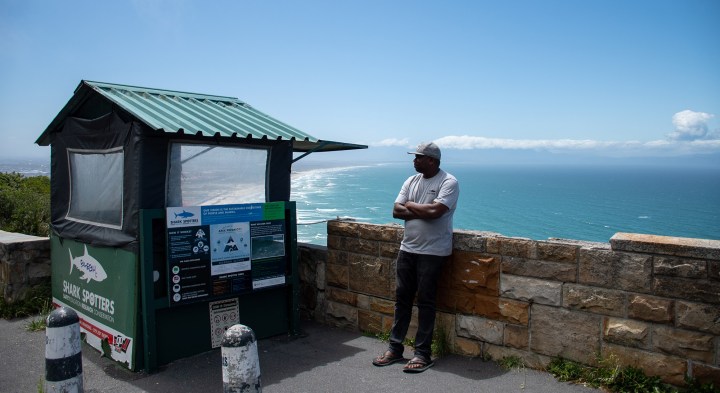
Since its inception in 2004, Shark Spotters – which is now the primary shark safety outfit used in Cape Town – has recorded 2,600 sightings, with only four shark incidents.
The first time Monwabisi Sikweyiya ever saw a shark was by accident.
In 2004 someone told him if he wanted to view trek net fishing he should go to Boyes Drive in Muizenberg, which has a great view of the ocean.
“And I saw sharks,” said Sikweyiya, now a field manager at Shark Spotters, “and I honestly hadn’t seen sharks in my life before.”
Sikweyiya said it was crazy to see them in the wild:
“But at the same time it got me thinking because, I mean, the way sharks are portrayed on television is; a shark sees a human, and goes for it. But it’s not like that. Most sharks are just minding their business.”
Sikweyiya has worked at Shark Spotters since its inception in 2004, born out of Cape Town communities’ need to find a way to protect themselves after several shark incidents, without harming sharks.
Shark Spotters CEO Sarah Waries explained to Our Burning Planet: “There was a community need for something to be done. So they looked at the fishermen who sat on the mountainside to spot fish, and they said well, if they can spot schools of fish, then we can spot a shark.
“So they put a shark spotter on the mountain, to see how effective it would be. And it did prove to be very effective. Now we’re operating on between four and eight beaches, depending on the season and the level of shark activity.”
No harm
Unlike other measures of shark protection, such as the lethal shark nets used in KwaZulu-Natal, shark spotting does not harm sharks – since all it needs is to place a spotter at a high vantage point overlooking a swimming beach. If the spotter sees a shark, he or she will radio their crew down at the beach to call the swimmers out of the water.
A recent study by Dr Enrico Gennari, a marine ecologist specialising in white sharks, from the Oceans Research Institute in Mossel Bay found that “an average of more than 30 white sharks are killed every year by the KZNSB [KwaZulu-Natal Sharks Board] programme for the last 40-plus years”.
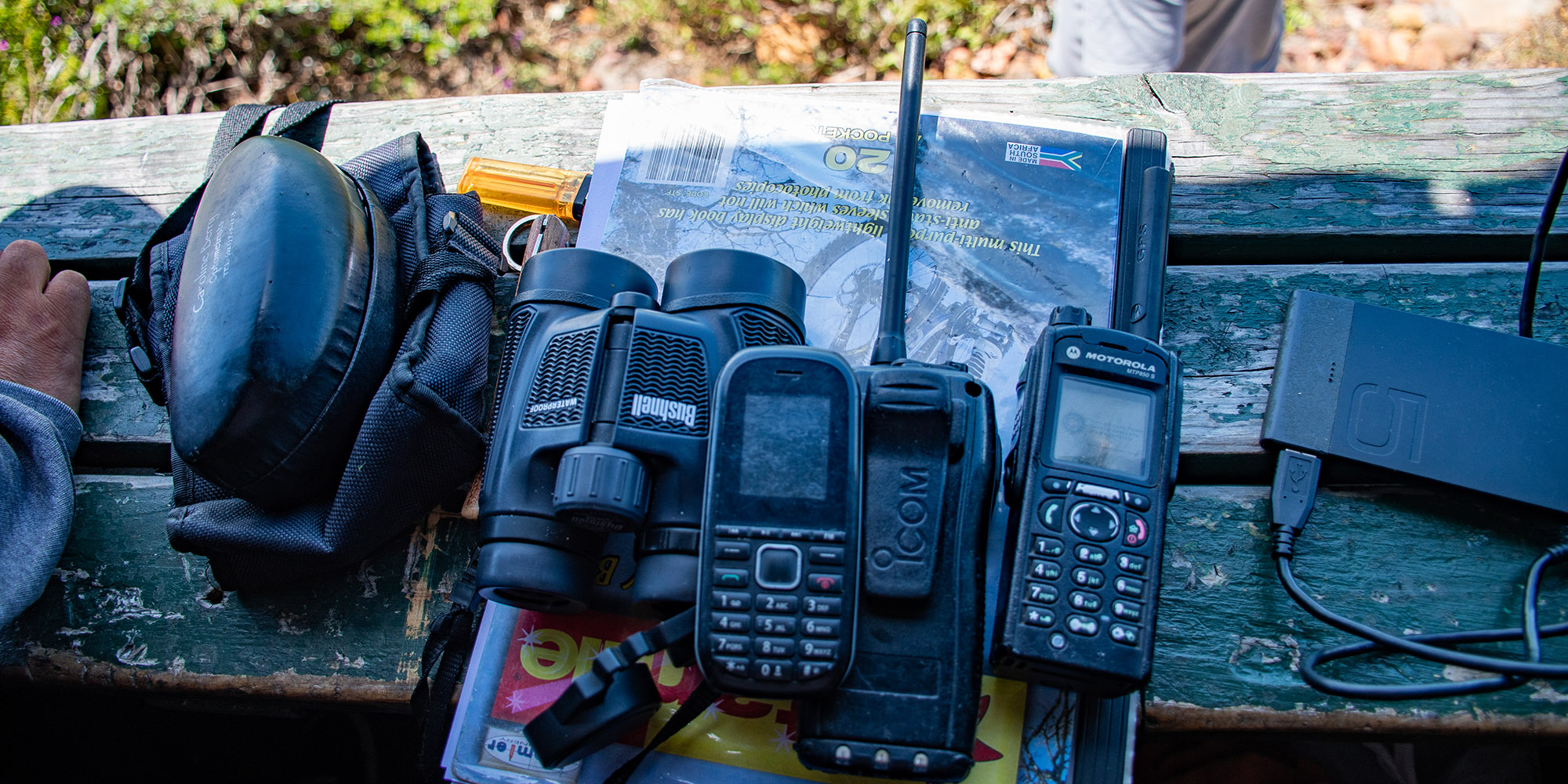
Shark Spotters at lookout points use radios to tell their colleagues on the beach when they need to clear the water. (Photo: Julia Evans)
Sikweyiya said: “Those nets are designed to catch and kill… the shark spotting programme, we sort of coexist with them – we get to share the ocean. We see a shark, get out of its way. It leaves, then we go back in.”
Waries agreed: “It was something that the City of Cape Town was very clear about when they started looking at shark safety. It’s not sharks or people, we actually need to protect them both.
“Taking this holistic, sustainable approach to shark safety has been very important and it’s the only thing that would work here. We couldn’t have shark nets, we’d be getting whales and dolphins and everything caught in them all the time.”
Since its inception in 2004, Shark Spotters – which is now the primary shark safety outfit used in Cape Town– has recorded 2,600 shark sightings and there have only been four shark incidents. One was at a beach that wasn’t monitored, two were outside of their monitoring area and one was where a swimmer ignored warnings and went into the water.
Despite its success, this type of shark safety programme is the only one like it in the world. Waries said some areas have ad hoc surveillance from aerial patrols but not continuous surveillance like they do. Spotters are at their post from 8am to 6pm (broken up into two shifts) every day.
‘Coolest job’
Shark Spotter Rozario Landore, who used to work in clothing retail, told Our Burning Planet from his viewpoint in Fish Hoek during his 8am-to-1pm shift:
“I feel like I got the coolest job… because Shark Spotters, it only happens here, it’s nowhere else in the world. And it’s quite a unique job.”
Seferino Gederblom, a Shark Spotter who was on the same shift on Boyes Drive, looking out over the popular Muizenberg beach, said the best part of his job is seeing sharks, as most people will never see a shark except for in a photo or on TV.
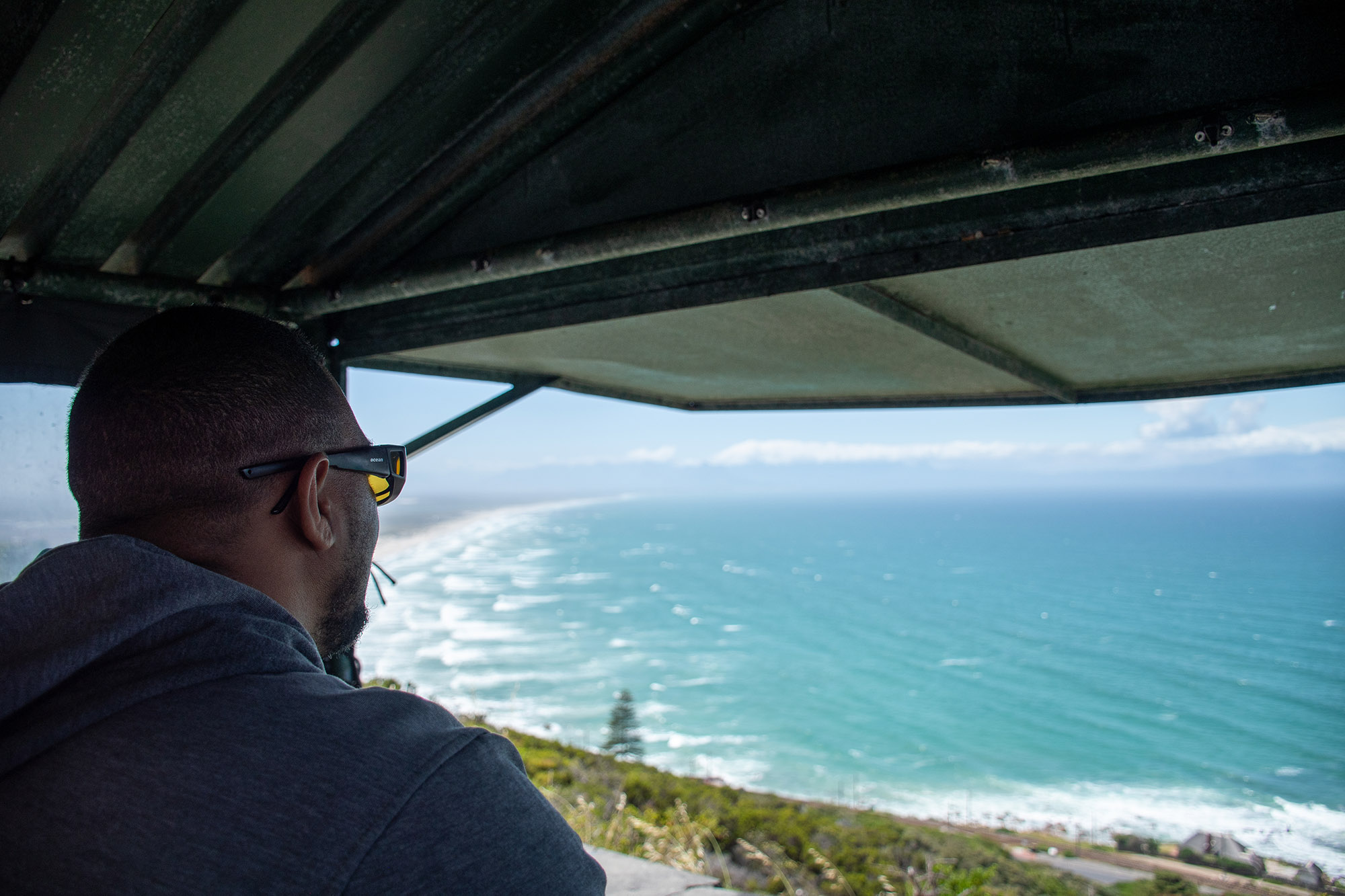
Shark Spotter Seferino Gederblom keeps an eye on Muizenberg beach. (Photo: Julia Evans)
He says nobody sees sharks like they do – “this is the closest you can get besides getting in a cage”.
Landore said he enjoys “not being cooped up in an office. You’re outside, you’re in nature, there’s no one breathing down your neck.”
Growing up on the coast, he had always appreciated nature. “Since we were boys. We used to walk through the bush going to the dam, go swimming in the dam.”
Shark Spotters comes to Plettenberg Bay
Shark incidents have been a hot topic of late as two fatal shark incidents occurred in popular holiday destination Plettenberg Bay in 2022.
Read in Daily Maverick: “No need to panic, say experts after fatal Plett shark bite incident”
While two shark incidents in one area in a year is an anomaly – there are only five shark-related deaths on average globally, according to the Florida Museum of Natural History’s International Shark Attack File – it sparked fear and concern over how people can protect themselves.
The Bitou Municipality, in which Plettenberg Bay falls, and the Plett Shark Action Group (PSAG) recently announced they had partnered with Shark Spotters to develop effective strategies to reduce shark-human interactions in the area.
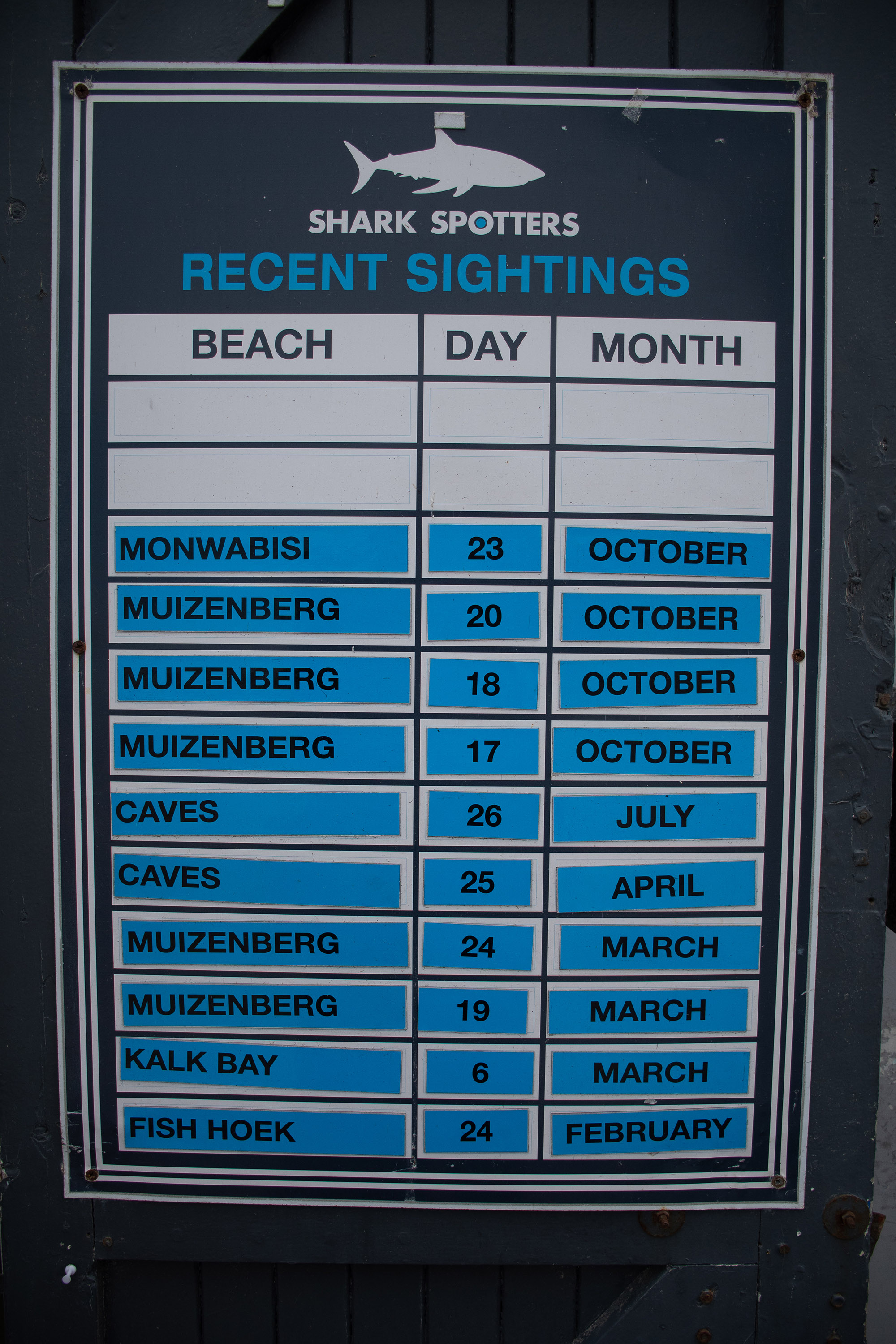
(Photo: Julia Evans)
Waries, who went to Plett with some of her team last week, said they scouted five spots where spotters can be placed and which will be trialled over summer.
“We think it shows good potential for shark spotting,” said Waries, adding that, “with any shark safety measure, there is no solution that is like a silver bullet that will work on every beach.
“We certainly need to do some more data collection, so we’re going to put spotters in place on these beaches, and see how effective they are, looking at where their visibility is and where the water users are. So it’ll be a six-month trial to see how effective spotting is in the area. There’ll be some safety measures in place over the festive season as well.”
Anjé Taljaard, environmental manager at the Bitou Municipality, told Our Burning Planet they “are fully aware of the fact that the ocean and its associated wildlife as well as our natural environment make a significant ecological and economical contribution to our town”.
The Plett Shark Action Group was formed with the vision of implementing “appropriate bather safety protection programmes and shaped by the fact that great white sharks are an endangered species worthy of all conservation efforts and critically important to Bitou’s local ecosystem.”
The Plett NSRI’s Jaco Kruger, who also chairs the Plett Shark Action Group, said: “It’s natural for the Plett community to support an eco-friendly approach.” There are two marine protected areas around Plett and there is also marine tourism, he explained.
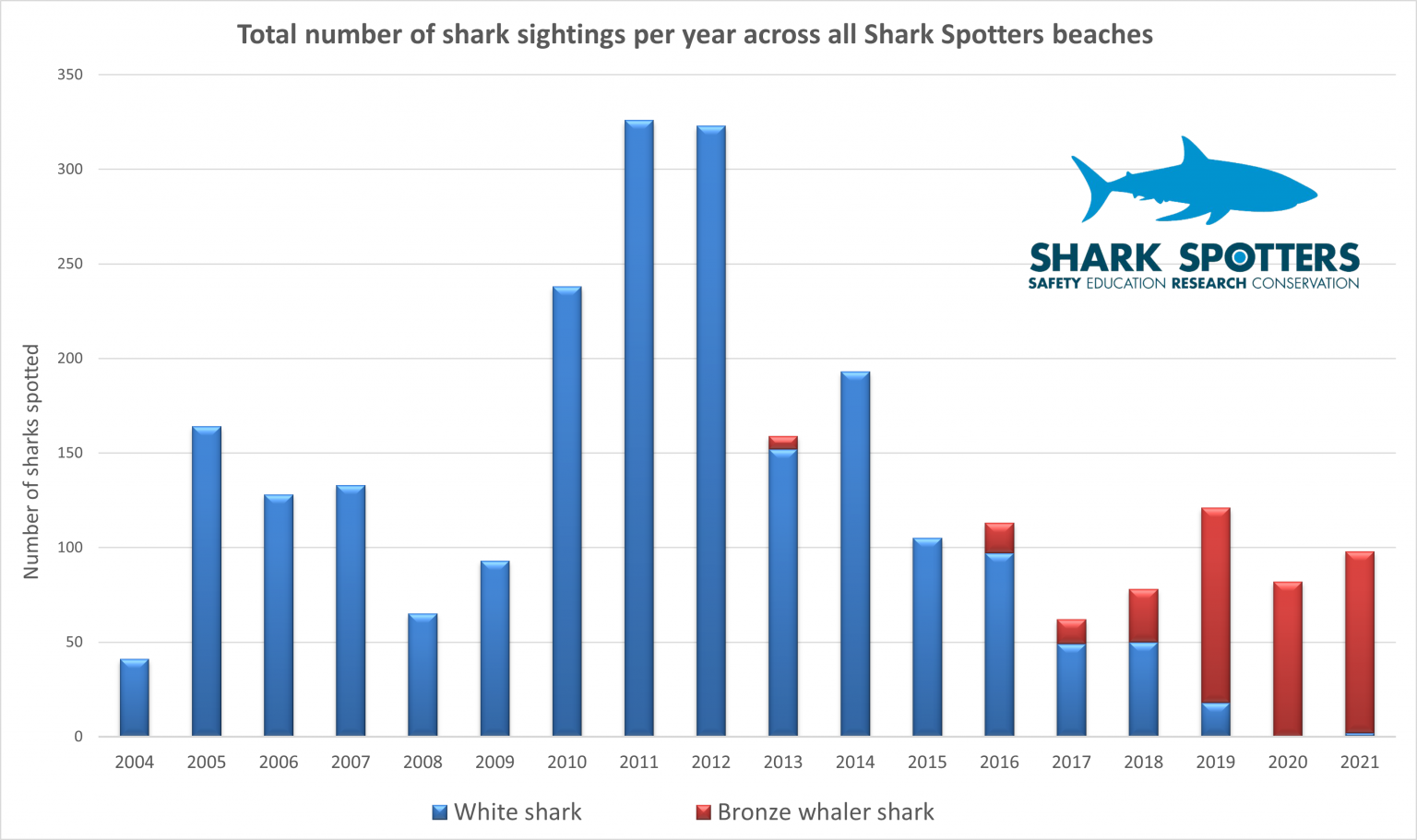
“And we rely from a tourism point of view on these to help our town create jobs. Kinda in Plett DNA. So we had to look at the different options for Plett.”
CEO of Plett Tourism Patty Butterworth said: “We need to safeguard the integrity of our precious marine ecosystem, because of the economic benefits it brings to the town and because it is the right thing to do.”
Why a conservation-centred programme is essential
Coastal towns choosing a shark protection programme centred on conservation is vital as white shark species have been declining over the past two decades.
There are many reasons for this, including lethal shark nets used in KwaZulu-Natal, a couple of orcas in False Bay who started killing sharks in 2017, and sharks’ food source being threatened.
Sara Andreotti, a marine biologist whose research has focused on white shark conservation and who is also CEO of SharkSafe Barrier, an eco-friendly and conservation-centred shark safety alternative, explained to Our Burning Planet:
“What we think happened in South Africa is that while white sharks have been protected since 1991, that protection didn’t apply to the other smaller species of shark that are part of white sharks’ diet.”
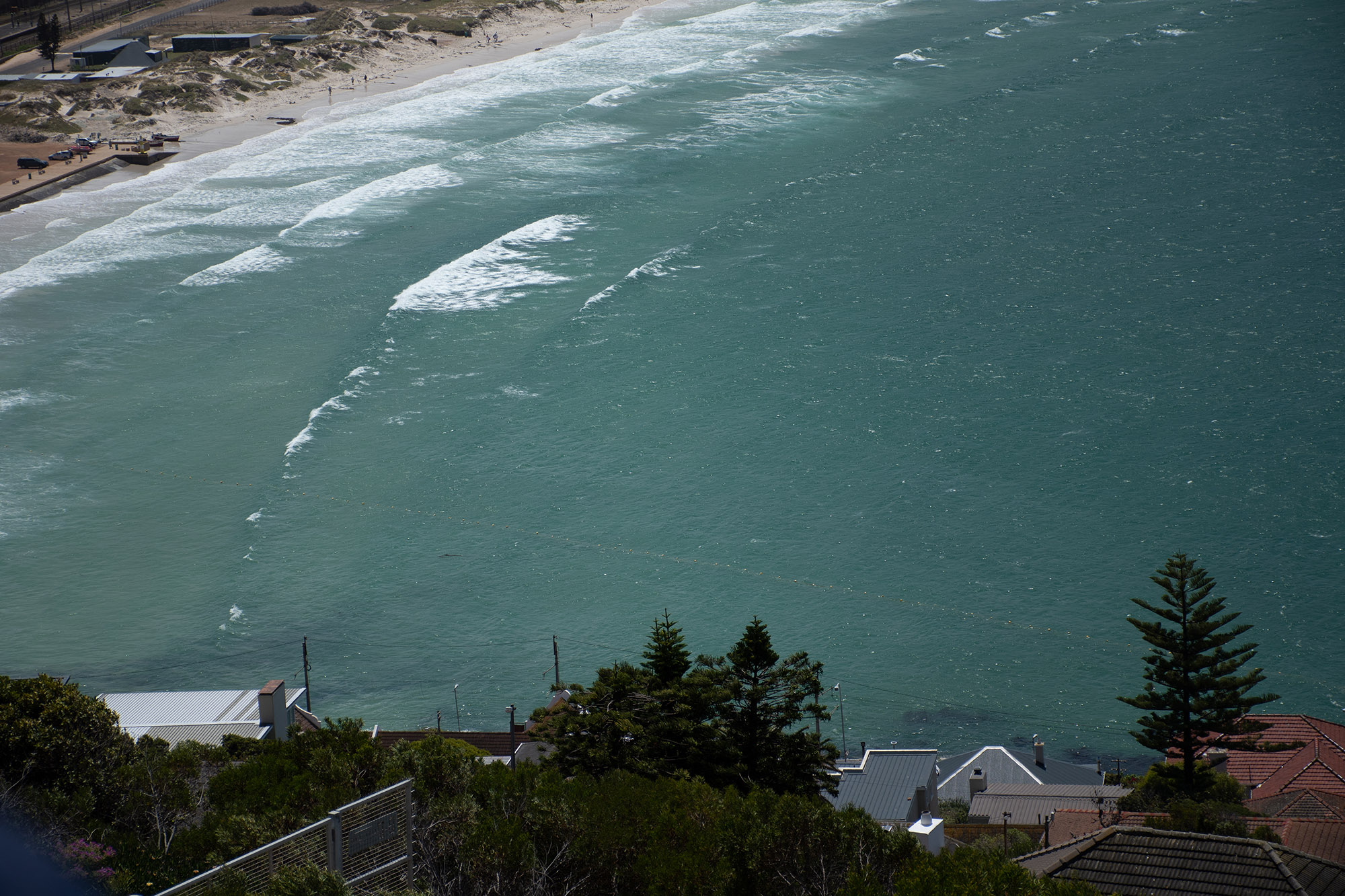
What Shark Spotters see from their sighting spot in Fish Hoek. The yellow buoys indicate exclusion nets which are designed to not trap any marine life and are taken out every evening and put back most mornings if conditions are right. (Photo: Julia Evans)
Adult white sharks had evolved to eat things juveniles didn’t. “Which is amazing because it means adults and juveniles are not going to compete for the same food resources. When they’re small they eat other fish and other sharks, when they grow up they eat also marine mammals and other sharks… evolutionary wise, they got it spot-on.
“But they didn’t predict the humans.”
Andreotti said the soupfin shark population crashed in 2008 in Gansbaai because of overfishing, and though most medium- to large-size sharks are still legally fished, such as bronze whalers, some that are illegal to fish in South Africa are exported to Australia where the regulations are different.
“There seems to be an ongoing fight about what is the reason – is it the orca? Or is it the KZN Sharks Board? Or climate change? Or overfishing? Of poaching?
“It’s all of the above. What we should start considering is which of all of the above can we actually fix, and which can we fix faster than others.”
And those fast solutions include eradicating the lethal fishing nets the Sharks Board uses, as well as using technology to obtain real-time data and enforce by-catch regulations.
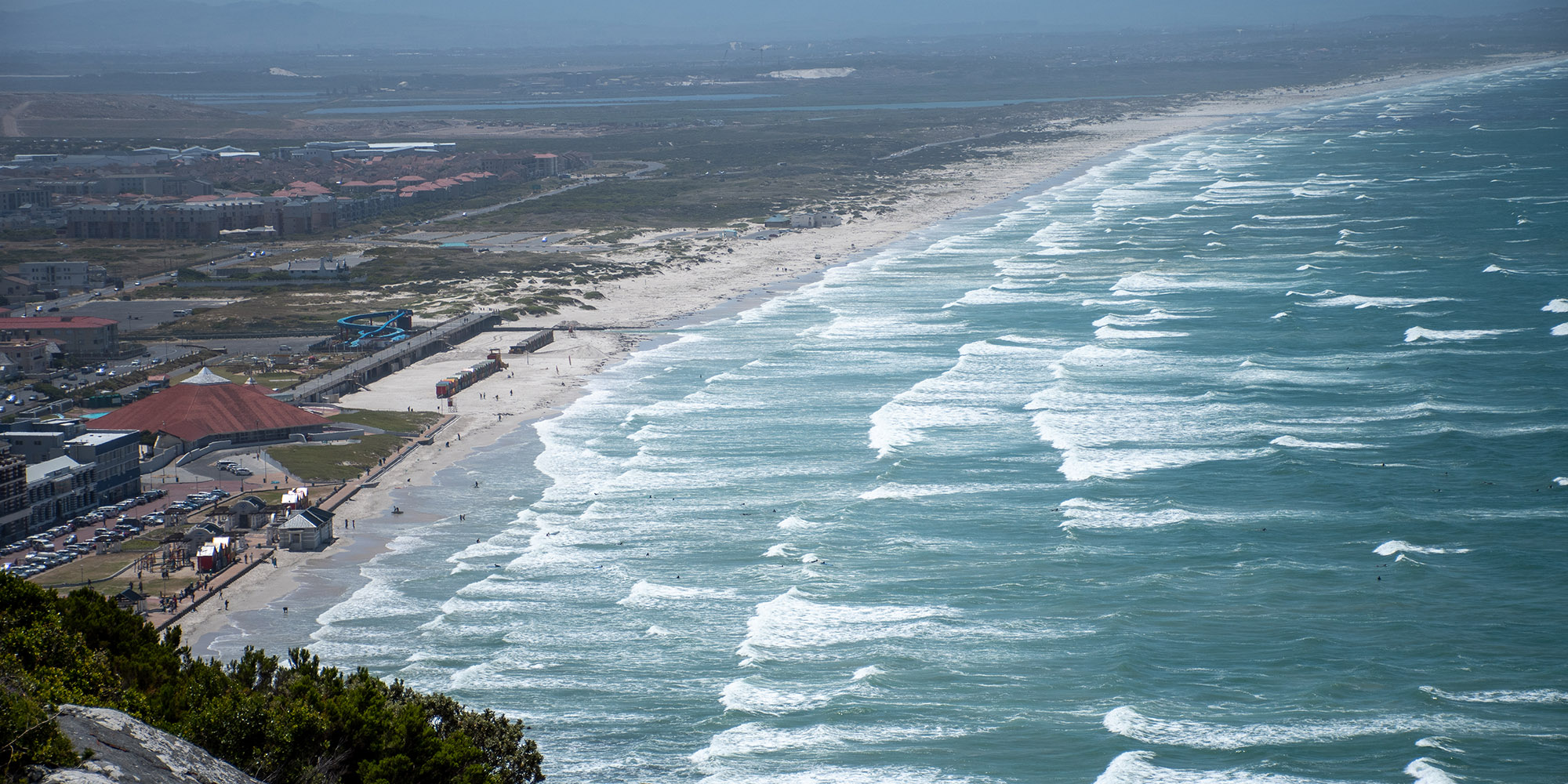
A view of Muizenberg beach from the spotting hut on Boyes Drive. (Photo: Julia Evans)
Adreotti said in the past we may not have had the technology but “these days you can put a camera with software that doesn’t just record in real time what is happening on a fishing vessel, but can also analyse which species are getting caught and analyse how much by-catch of which species are they getting.
“If you start collecting real-time data on the fishing vessels, the amount of catches and by-catches, we will have a clearer picture on the impact of fishing and overfishing.”
She added: “The problem with fishery and overfishing is a complex matter – you cannot just stop fishing, because this will have a profound impact on the local economy and livelihood. Certain species can actually be sustainably fished, but we don’t have enough information, especially on shark populations in South Africa. We actually lack data and by the time the data catches up, it seems to be always too late.”
Making conservation accessible
For many communities in South Africa, issues like the climate crisis or conservation are not on their radar because they have more immediate threats to deal with.
As a result, conservation can be seen as a privilege.
With programmes like Shark Spotters, conservation can become more accessible to communities while providing jobs.
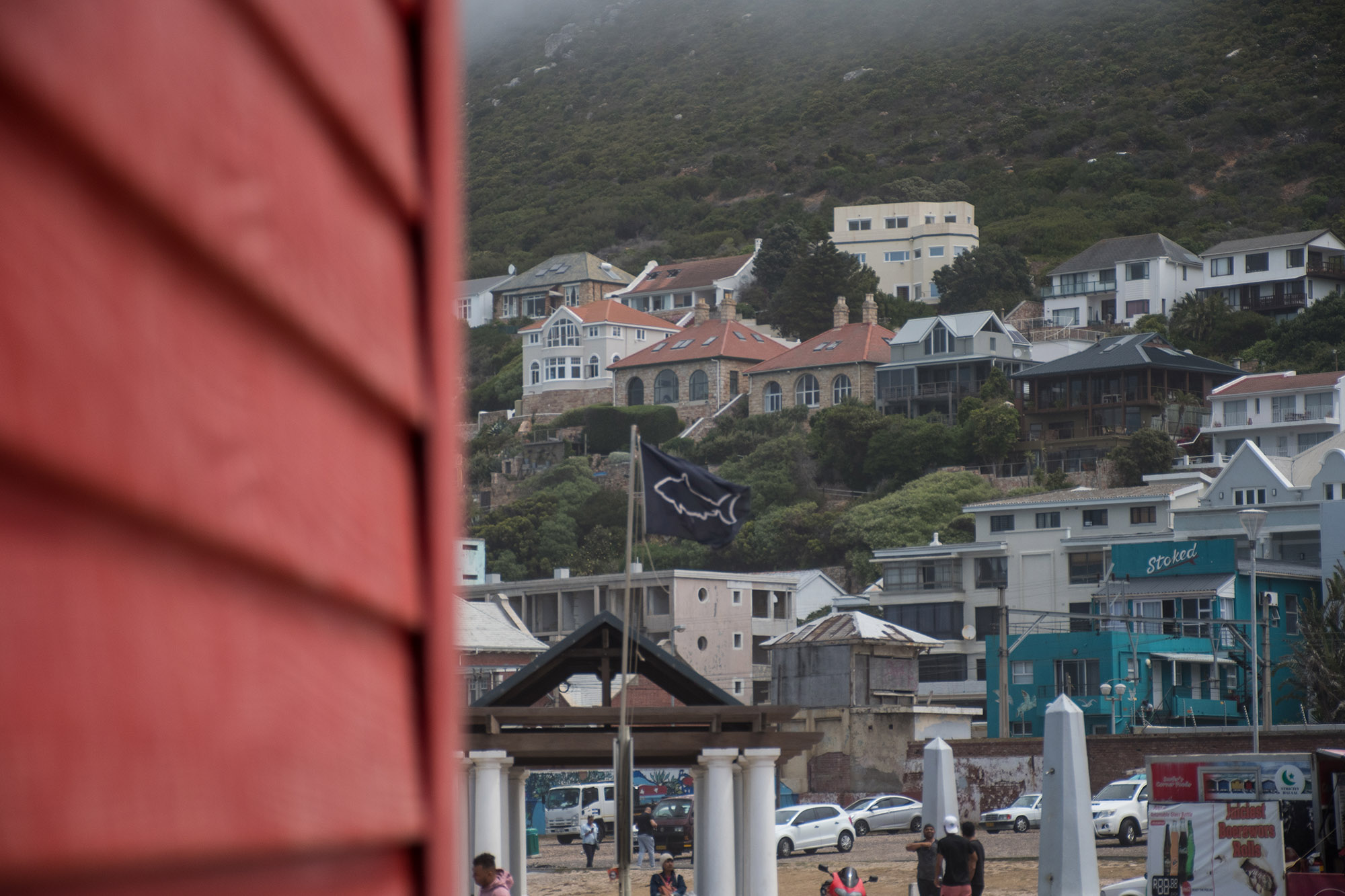
The black flag means sighting conditions are poor and swimmers should be cautious, but are still allowed to swim. (Photo: Julia Evans)
“One of the things that I really like most about Sharks Spotters is that it takes people who wouldn’t necessarily have this kind of link to the ocean, and we provide a lot of skills development… job creation,” said Waries.
Shark Spotters (only operating out of Cape Town at the moment) has 56 employees, 95% of whom are from previously disadvantaged communities. The staff includes about 25 spotters, 10 exclusion net crew, 10 coastal crew and a research team and management.
Waries said that along with extensive training that enhances professional and personal development, they have a very low staff turnover, with most having worked there for at least five years.
Visit Daily Maverick’s home page for more news, analysis and investigations
Sikweyiya, who lives in Khayelitsha, previously worked as a lifeguard:
“I was a lifeguard with a first-aid shark attack kit. So I was just someone that’s waiting for something to happen… that was not enough… I think it’s [conservation] not spoken about enough. I don’t think the majority of the people actually know about it.”
He added that there was a need for people to be educated about ocean conservation, particularly plastic pollution, which he sees a lot of.
Said Waries: “Involving communities in conservation is really vital… Because you have to have the people who are living alongside the coast to start caring about it. And anybody on our team is a champion within their own communities for conservation.”
Landore, from Ocean View, said: “Before Shark Spotters I had a bit of knowledge of the ecosystem… since being employed by Shark Spotters I’ve learnt so much more… and why it is so important for us to actually protect it.”
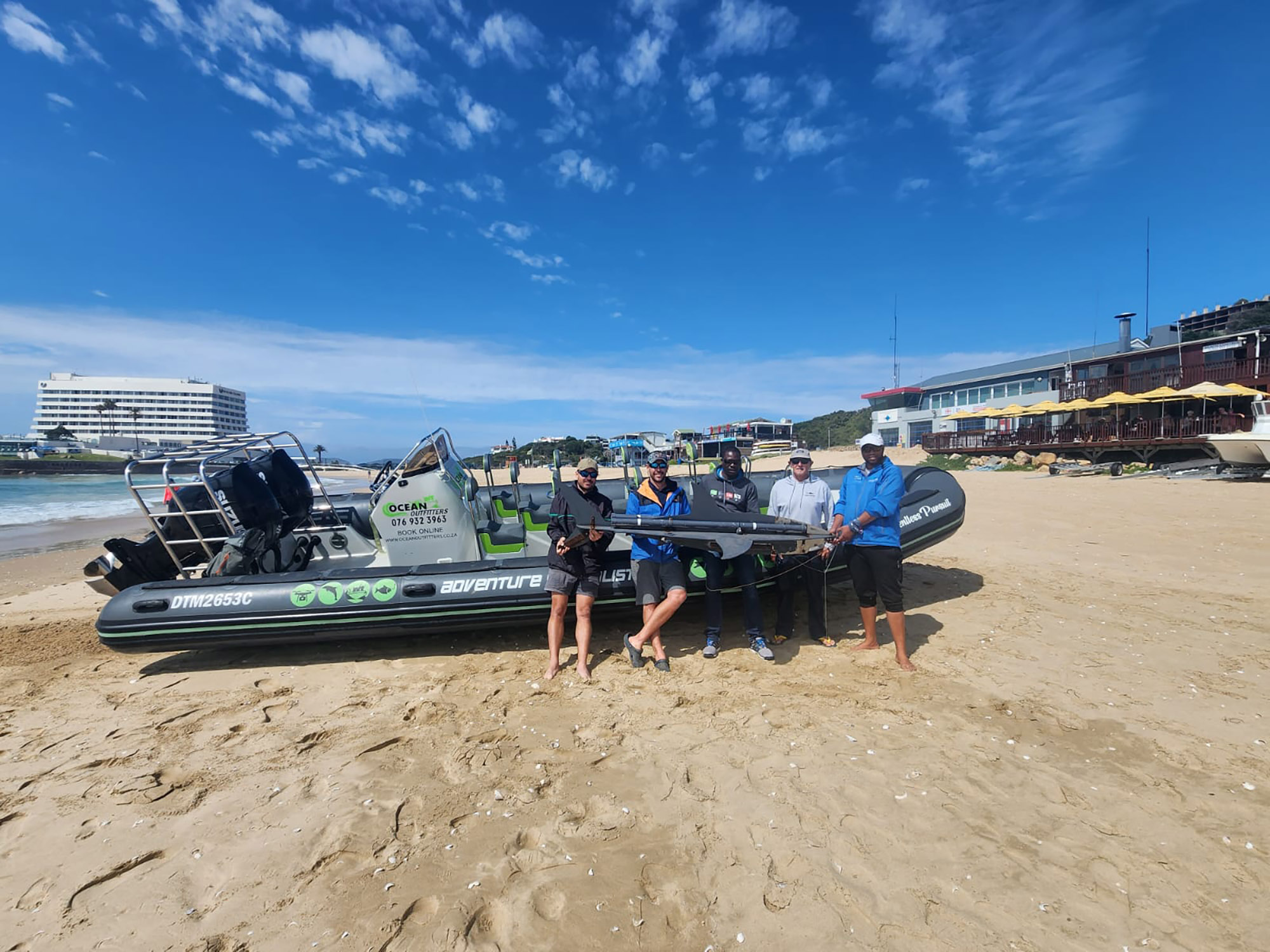
From left: Jarryd du Preez and Patrick McDonald from the Ocean Outfitters Marine Conservation Trust; Dennis Chikodze, Howard Gold and Tino Simmerie from the Cape Town Shark Spotters training team, holding a replica of a shark they used to pull behind their boat so they could stake out vantage points for spotters. (Photo: Shark Spotters)
In terms of using Shark Spotters to create jobs, Plett Tourism’s Butterworth said: “Short-term plans include the hiring and training of individuals to work within the Shark Spotters programme, which may also include a programme to educate the public on water safety and the ecology of marine life in Plett.
“Future plans include additional possibilities with employment as we are currently investigating the option for an eco-friendly barrier and a sustainable education programme.”
Learning not to be afraid of sharks
Landore says many people are scared of sharks:
“I think that the knowledge that they have is minimal. Before… I was scared of the sharks as well. But then I came to realise, look, that’s their kitchen. We are the intruders in their environment.”
Along with protecting the healthy balance in an ecosystem, Andreotti said conservation is vital to change the attitude we have towards sharks.
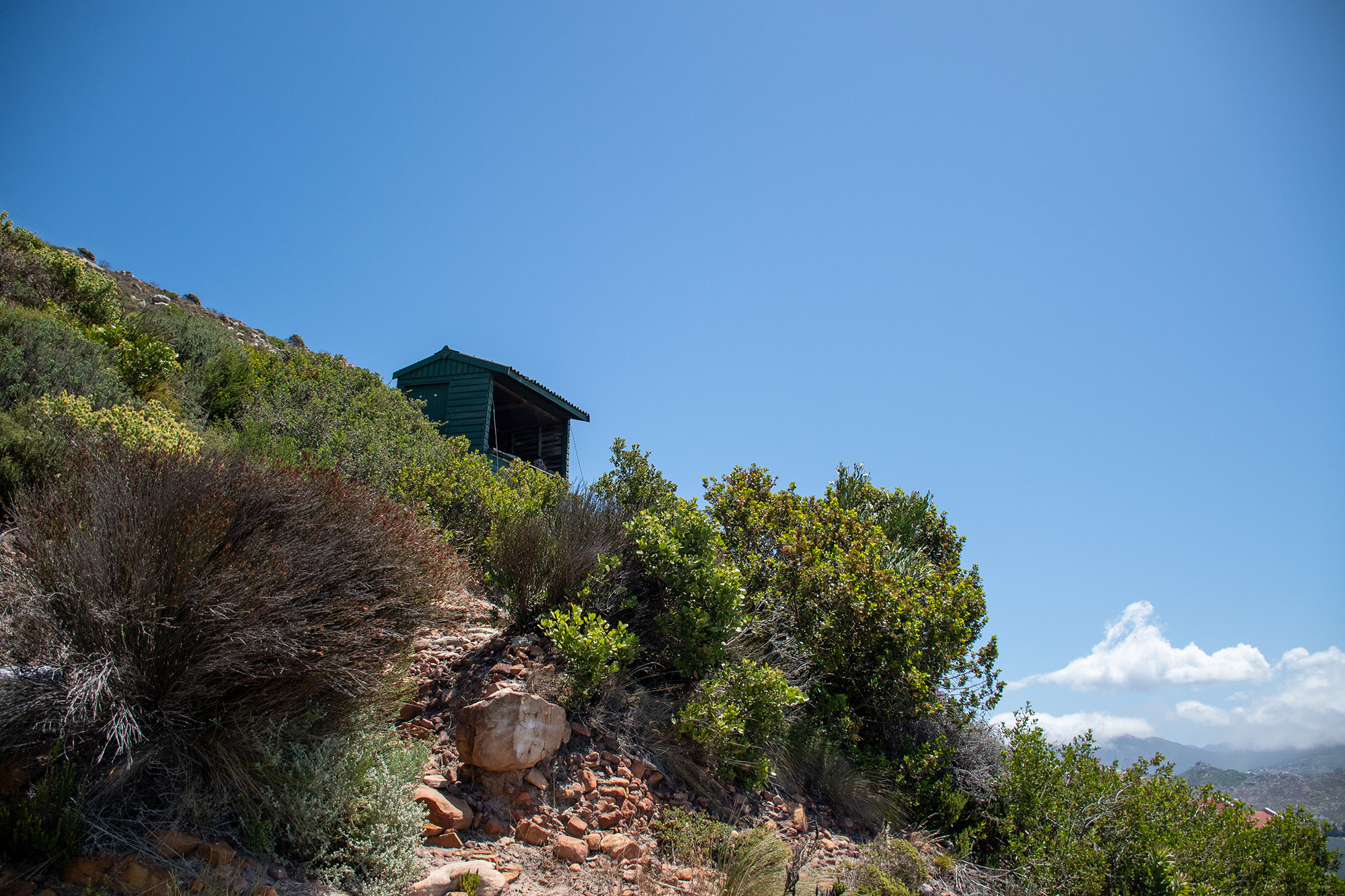
The sighting spot in Fish Hoek. (Photo: Julia Evans)
“Ideally, people should start treating shark accidents the same as any other big predator accident: just a very unfortunate accident. It’s very sad, tragic and very traumatic, but it is also an extremely rare event. Shark-related fatalities happen between six and eight times a year, globally… it shouldn’t be as newsworthy as it still is.
“I realise people really can get very traumatised by something like that… to prevent the trauma it is important to have an eco-friendly system to keep sharks separate from people in the area where the people want to enjoy the ocean. And we need people to enjoy the ocean because that is the best way for them to start caring about it. Also, it will be easier to have conversations around shark conservation.”
Andreotti said it’s not just about protecting a surfer from a shark, but letting the surfer stop having a reason to be afraid of sharks. DM/OBP






















 Become an Insider
Become an Insider
Comments - Please login in order to comment.